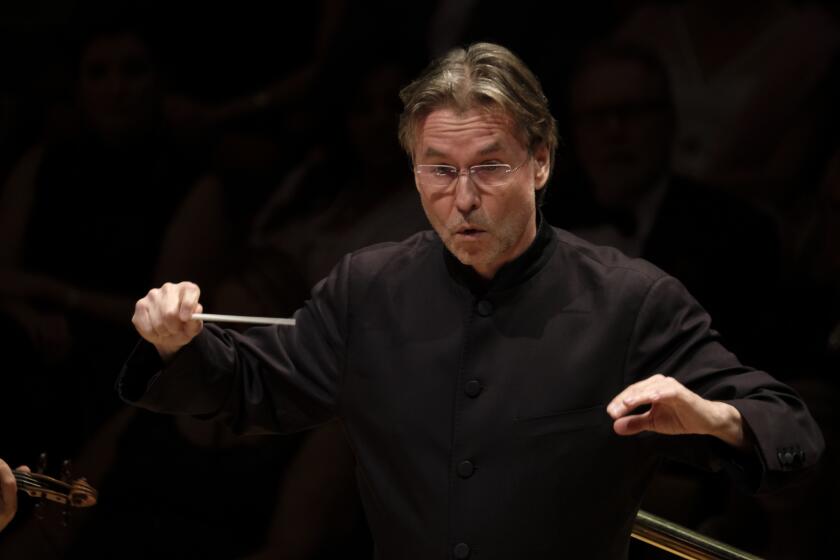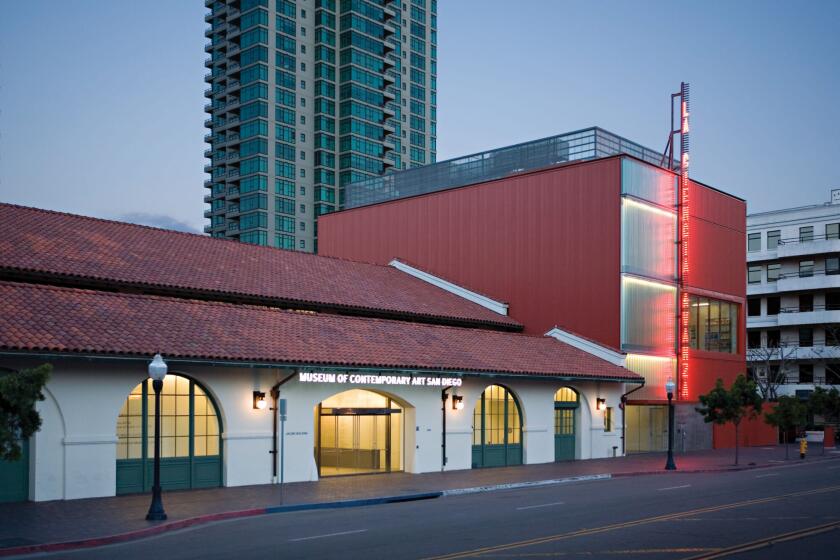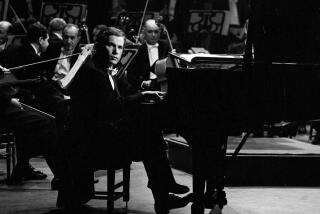What made Maurizio Pollini a piano god? Even his late recordings are a revelation

- Share via
In 1960, an 18-year-old Italian pianist, the youngest contestant, won the prestigious International Chopin Piano Competition, held every five years in Warsaw. “That boy,” the revered pianist Arthur Rubinstein, honorary chairman of a 37-member jury, famously announced, “can play the piano better than any of us.”
Live recordings of Pollini playing Chopin in the competition back Rubinstein up.
Rubinstein’s quip has been used in seemingly every tribute to Maurizio Pollini since his death Saturday in Milan at 82.
Pollini went on to have a storied career. Inevitably, sharks smelled commercial blood, as they always do in this business, and pounced to sign Pollini to lucrative record deals and concerts. But the keyboard wunderkind happened to have been an uncompromising perfectionist. Before joining the piano rat race, Pollini insisted on taking time to learn repertory and to mature. Although Pollini did record Chopin’s First Piano Concerto upon accepting his prize, he otherwise kept the sharks at bay for close to a decade.
Pollini always put the music first. Typical top soloists can give upward of 100 performances a year; Pollini kept it to a third that number, at most. When he came to New York, for instance, he stayed a month or two. He allowed time for music and for life to settle in.
He played what he wanted, where he wanted and with whom he wanted. He put the composer first, spending his life digging deeper and deeper into Beethoven, Bach, Schubert, Schumann, Chopin, Brahms, Debussy, Schoenberg. He also championed works by some of his most challenging contemporaries, particularly three towering figures in the European avant-garde: Luigi Nono, Pierre Boulez and Karlheinz Stockhausen.
Conductor Esa-Pekka Salonen’s statement about the San Francisco Symphony board has crucial ramifications for arts organizations including the L.A. Phil.
Pollini’s astonishing technique left you in awe. He was an architect in sound who made sonic edifices of a Beethoven sonata, or a Boulez one, that left you in awe. The speed, the direction, the power, the sweep — all of it, awesome. All of it authentic. Everything mattered. Which recordings reveal this? All of them. Listen to anything. His record company (Deutsche Grammophon) had to accept that its exacting pianist would not allow the release of anything not up to his exalted standards.
Pollini does have his deniers; all gods necessarily do. Some found him cold, calculating, mechanical, even a little boring. He walked on stage purposefully, straight to the piano, barely acknowledging the audience, all business. He sat down and played. He didn’t wait to get in the mood. He didn’t wait for the audience to settle in. He didn’t show emotion. He wanted to be a conduit to the composer.
Pollini was polite, elegant, erudite, somewhat shy and very private. He granted few interviews. I luckily got one for the Wall Street Journal when he came to New York in the spring of 1988 to perform all of Beethoven’s middle-period piano sonatas in three programs, over three weeks, at Carnegie Hall.
I had casually remarked to a publicist for his record company that if she got the chance, she should ask Pollini whether he had any interest in playing Morton Feldman. She did, and Pollini told her he’d like to hear more and asked to bring me backstage after a concert. That meeting led to an interview at his hotel suite two days after his last Carnegie recital (it turns out, exactly 36 years before his death March 23).
He had one ground rule: no personal questions. None were needed. When I arrived, I was greeted by his wife, who wasn’t sure where he was until she found him mischievously trying to sneak a cigarette. The world’s most disciplined pianist couldn’t quit the habit. He offered an espresso and told me he needed 20 on days he performed to get onstage. His young son, Daniele, in a bright yellow jump suit, merrily bounded in, to his father’s delight. Daniele was a talented piano student, Pollini said, adding that his son didn’t need to become a pianist (he has, indeed, followed in his father’s footsteps).
What the success of John Cage’s ‘Europeras 3 & 4’ in Detroit and Christian Wolff’s 90th-birthday celebration in New York reveal about this moment in music.
Pollini talked about his father, Gino Pollini, a leading Milanese architect and one of the founders of Gruppo 7, the collective that modernized Italian architecture. Pollini told me he was influenced by his father’s rationalist architecture and even more so by his uncle, the noted sculptor Fausto Melotti.
Melotti, who began as a Futurist, made works by applying musical logic, seeking equivalences of tonal resonance, harmony, counterpoint and the like in plaster, clay and steel. Pollini also noted the importance of silence to his uncle.
A complicated artist, Melotti collaborated at first with the Mussolini’s fascist regime. Pollini didn’t say as much, but this may have contributed to his own embrace of left-wing politics. He, along with his very close friend, the conductor Claudio Abbado, and Nono all voted for the Italian Communist party, since it was anti-fascist. And the three collaborated on new Nono compositions with strong political reach.
For Pollini, music could have very specific meaning, or no meaning at all, he told me when we slipped outside in the chilly air so he could steal another smoke. It need be neither hot nor cold, neither loud nor silent. It was, first and foremost, architecture. How it is put together is music’s meaning. Pollini, then, saw it his responsibility not to tell you how to feel but to stimulate emotion so that those emotions can be yours.
How Pollini did this was his true greatness. He used time. He revealed the composer’s vision through many sonic shapes and forms, be they the lyricism of a Schubert adagio, the rapture of a Chopin nocturne, the otherworldly drama of Beethoven’s Opus 111 sonata, the shard-like intricacies of Boulez’s Second Sonata.
The secret, though, was the raw material of sound, his tone, his way of finding a life-force in every note. Pollini was, if there can be such a thing, a panpsychic pianist. Panpsychism may remain a controversial theory in science that contends that consciousness extends to everything in the universe down to the smallest elementary particle, but Pollini’s playing has something to say about it. If every sound felt like a living cell, the grand structure couldn’t fail to seem like a living organism.
The fate of site-specific artworks by Maya Lin, Robert Irwin and Richard Serra remains in question, as does the public’s ability to see them.
The last time I heard Pollini perform was at the Lucerne Festival in the summer of 2016. He had had a history of heart problems, and this time he came onstage seeming lost, walking around the piano before sitting down. The first half of the recital was a mix of Chopin pieces, which he played uncertainly. After intermission came the second book of Debussy’s preludes, more convincing but not the old Pollini. What he did retain was the tone and, to some extent, the purpose.
After that, Pollini had many cancellations, and when he could play, he reportedly exhibited further decline. He continued to record, but I stopped paying attention. I’ve now caught up with those late recordings and find them a kind of revelation. The architecture stands but isn’t as sturdy. Pollini stumbles, loses direction. He focuses instead on the moment, and our awareness shifts to building blocks. The individual notes and short phrases vibrating with Pollini-panpsychic life-force become the essence of everything.
When I brought up the question of whether he’d record Feldman, Pollini smiled and said maybe. He never did, but his late recordings of Debussy and Beethoven have their moments of the quiet, slow-moving, time-stopping quality of Feldman’s late piano scores. I hear them as not playing Feldman but playing for Feldman, which may not be all that different. Can it be that behind that ultra-rationalist exterior, what made Pollini a piano god was that, at the core, he was a mystic?
More to Read
The biggest entertainment stories
Get our big stories about Hollywood, film, television, music, arts, culture and more right in your inbox as soon as they publish.
You may occasionally receive promotional content from the Los Angeles Times.














